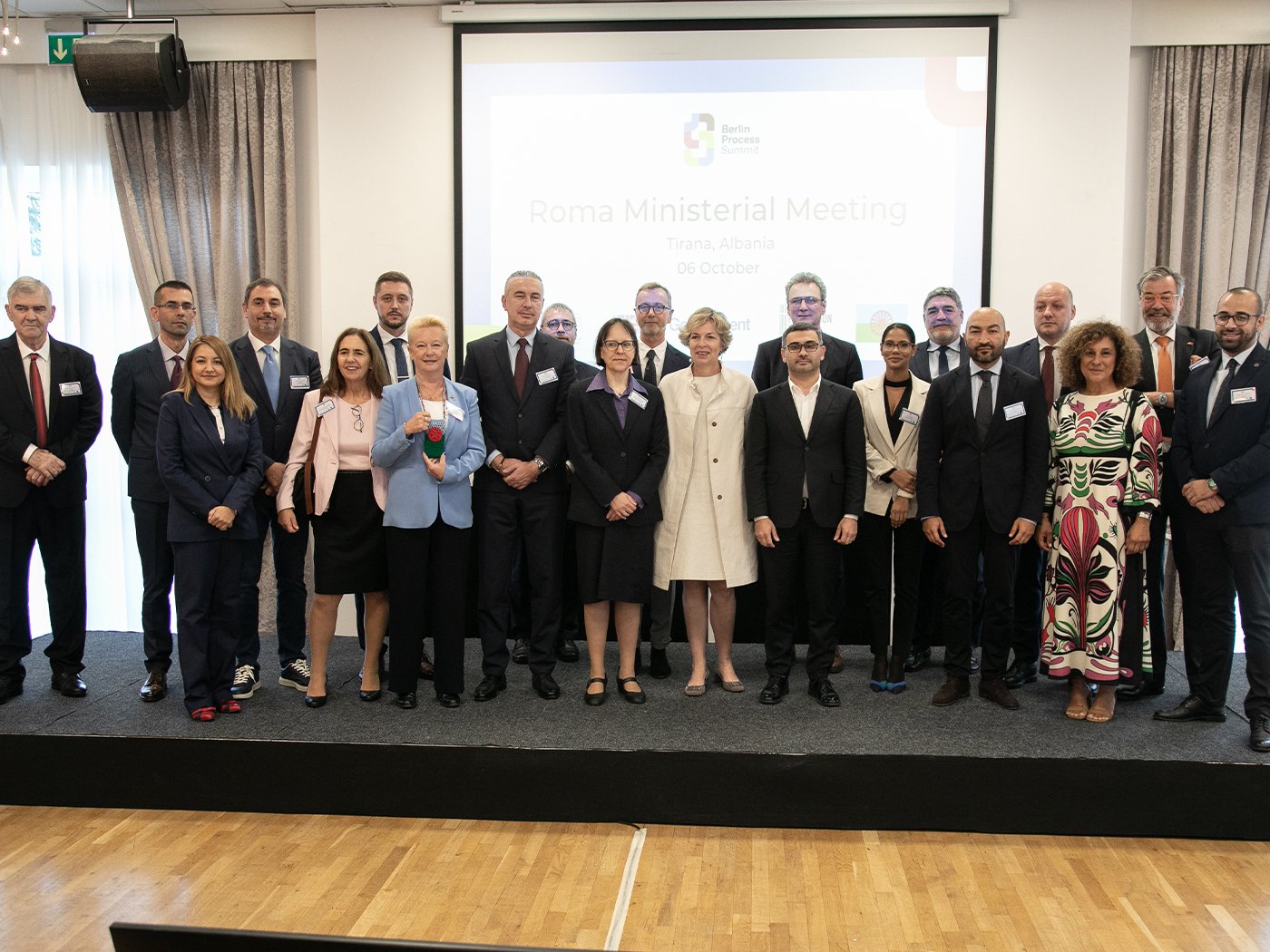The Roma community across the Western Balkans benefits from renewed commitment to tackle discrimination and improve access to essential services. Representatives from across the region gathered in Tirana for the Berlin Process Roma Ministerial Meeting to strengthen efforts on employment, education and housing.
- Meeting in Tirana reaffirms commitment of all Western Balkans states to the Poznan Declaration on Roma inclusion
- The meeting focused on governments taking concrete action on employment, education, housing and tackling anti-Roma discrimination
- This year’s UK leadership of the Berlin Process drives regional cooperation in Western Balkans
The Roma community across the Western Balkans benefits from renewed commitment to tackle discrimination and improve access to essential services. Representatives from across the region gathered in Tirana for the Berlin Process Roma Ministerial Meeting to strengthen efforts on employment, education and housing.
The meeting, hosted by Albania's Ministry of Health and Social Protection, the Roma Foundation for Europe, and the British Embassy Tirana, reaffirmed the Poznan Declaration, a landmark agreement that commits governments to take concrete actions on Roma inclusion across four key areas: employment opportunities, educational access, housing conditions, and anti-discrimination measures.
Anti-Roma discrimination undermines progress across all areas of society in the Western Balkans, requiring coordinated legal and social responses. Participants examined strengthening anti-discrimination frameworks and community relations throughout the Western Balkans region. Antigypsysm, recognized as a barrier to inclusion, will be combatted by embedding Roma history and culture in education curricula.
The meeting presented concrete steps to tackle these infrastructure issues, with participants reaffirming their commitment to legalising informal Roma settlements wherever feasible and improve planning and infrastructure to provide safe, adequate and sustainable housing that is energy-efficient and resilient to climate-related risks.
Employment discrimination and educational exclusion remain key concerns. Many Roma families face restricted access to decent work due to systemic bias, while Roma children encounter disproportionate barriers in education that limit future opportunities. Attendees pledged to prioritise increasing enrolment and attendance in schools and increase digital equity by expanding access to internet and devices. Other measures include improved employment access and targeted skills development programmes.
The Berlin Process provides essential regional cooperation on Western Balkans integration. Under UK leadership this year, the process continues driving political and economic progress toward European integration.
Opening remarks were delivered by Minister Prof. Evis Sala of Albania's Ministry of Health and Social Protection, British Ambassador Nicholas Abbott, European Union Ambassador to Albania Silvio Gonzato, and Roma Foundation for Europe President Zeljko Jovanovic.
Minister Sala thanked the UK government for leadership during the Berlin Process and welcomed the meeting as a significant step toward Roma inclusion.
“Over the past five years, as Albania has progressed on its path toward European integration, notable advancements have been achieved in improving the situation of Roma and Egyptian minorities across key sectors such as education, employment, housing, healthcare, social protection, civil registration, and access to justice—guided by international standards and best practices.
The integration of Roma and Egyptian minorities remains a shared responsibility and a prominent example of where coordinated efforts are essential—across all levels of governance and throughout every sector of society. It necessitates the establishment of sustainable frameworks for cooperation among Western Balkan countries, between central and local government structures, and with civil society organizations.”
His Majesty's Ambassador to Tirana, Nicholas Abbott, highlighted the importance of this meeting for regional progress whilst emphasising the practical nature of the commitments made.
"The declaration emphasises the importance of aligning Roma inclusion with broader regional priorities, including the green and digital transitions, recognising that Roma communities must not be left behind in these transformative processes. These commitments are not just political—they are practical. The UK stands firmly with you in calling for meaningful Roma participation at every stage of policy design and implementation."
Zeljko Jovanovic, President of Roma Foundation for Europe, highlighted the potential of Roma empowerment for the region’s economies.
“The reference to 66,000 additional jobs for Roma by 2030 is a welcome signal of ambition, but our own analysis shows the region must go further. Roma will make up nearly a third of new workers in some Western Balkan countries and training them for deficit occupations pays off in less than three years. Exclusion is unjust and unsustainable – it costs hundreds of millions annually and weakens competitiveness. At a time of renewed momentum for EU enlargement, Roma economic empowerment must be seen not as a side issue, but as a driver of the region’s future growth and stability.”
EU Ambassador to Albania, H.E. Silvio Gonzmato, emphasised the fundamental importance of Roma inclusion.
“Enabling Roma communities to participate fully in all aspects of society is not only a matter of justice—it is a fundamental right and an essential step toward building more diverse, equal, and inclusive societies. These values are often questioned or challenged, but they remain the principles at the heart of the EU”, said EU Ambassador Silvio Gonzato.
The Berlin Process emphasises inclusive growth and democratic values across the Western Balkans region. Roma inclusion remains central to achieving sustainable development and European integration goals.

Roma Foundation for Europe
The latest

Serbia Must Amend Missing Persons Alert System to Protect Vulnerable Adults

Constitutional Review of the Šutar Law Confirms Serious Rule-of-Law Concerns

Europe’s Growth Depends on Roma Talent
Browse by category
Campaigns
Events
Facts
Press
Voices
For media inquiries:
[email protected]Sign up here so you don’t miss out on campaign updates, upcoming events and other news from the Roma Foundation for Europe and our network.
Sign up for our newsletter